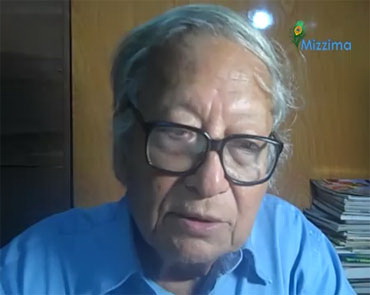Despite its boycott of Sunday’s elections, the National League for Democracy wants to do what it can to alleviate the increased ugliness ...
Bangkok (Mizzima) – Despite its boycott of Sunday’s elections, the National League for Democracy wants to do what it can to alleviate the increased ugliness “election fraud” adds to Burmese politics, a senior NLD member indicated on November 9th.
 NLD central executive committee member and former political prisoner, Win Tin, 81, told Mizzima that “this kind of vote-rigging happening in politics has bad consequences for Burma’s politics. If we take the view that bad politics in turn lead to bad consequences for the people, then we are also responsible”.
NLD central executive committee member and former political prisoner, Win Tin, 81, told Mizzima that “this kind of vote-rigging happening in politics has bad consequences for Burma’s politics. If we take the view that bad politics in turn lead to bad consequences for the people, then we are also responsible”.
“Although we are boycotting this election, we feel that we are also partly responsible. Therefore, we will try to remedy the situation and take appropriate actions,” he said. How? “For the moment, I can’t tell you how. We still have to decide on that matter.”
Both the NLD and National Democratic Force (NDF) went into the elections with clear and distinct approaches. In fact, that the NDF exists separately from the NLD is the result of exactly that distinction: when it became clear in August of this year that the junta would not allow the NLD to participate in the elections, and that it would not tolerate a democratic alternative to a military-guided government, the opposition was faced with a dilemma.
On the one hand, it could take the high road and refuse to participate in a clearly unfair, unrepresentative process, and hold to its demands of fundamental constitutional and administrative change before elections. This is the route pursued by Aung San Suu Kyi and the NLD as a whole.
On the other hand, some members of the NLD decided that, even with the flawed character of the elections, the parliament that would result could still be used by elected pro-democracy members as a route for pursuing reform from inside of Burma, both politically and geographically. The NLD members who opposed the boycott strategy left to establish a new party, the NDF, led by its chairman, Than Nyein, in order to contest the elections.
Does today’s statement by Win Tin indicate willingness on the part of the NLD, now that the election is a done deal, to reconsider the possibility of some level of participation within the new governmental structures?
Interestingly, Win’s statement comes at the same time that the NDF, recognizing the full scale of the junta’s massaging of the election results, has begun raising the possibility of not accepting the election results. Khin Maung Swe, an NDF leader, told Reuters that, “we took the lead at the beginning, but the USDP later came up with so-called advance votes and that changed the results completely, so we lost”.
As a consequence, Khin Maung Swe made the following statement: “We have told other parties not to sign declarations recognizing the results of the polls without a clear explanation about the overwhelming incidents of suspicious advance votes and irregularities during the vote-counting.”
Do Khin Maung Swe’s and Win Tin’s statements over the last couple of days add up to an indirect courting ritual between the two major components of the presently fractured democratic opposition and an attempt at amicably settling their current legal separation? After all, they share the same long-term objectives, differing only over the best means for achieving those objectives.
From the perspective of the NDF, the prospect of still going ahead and taking their seats within the Hluttaws (parliaments) can be used to leverage the NLD towards the NDF’s “pragmatism”. And for the NLD, presenting a bit of an apology, an indication of a willingness to be more pragmatic, could serve to court rapprochement with the NDF without conceding too much.
The next few days should provide further indications of just what the NLD – and the NDF – can do to “remedy the situation and take appropriate actions”.



